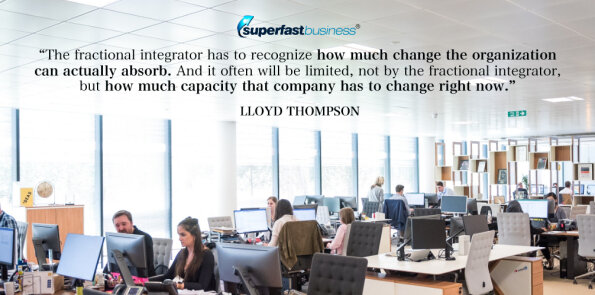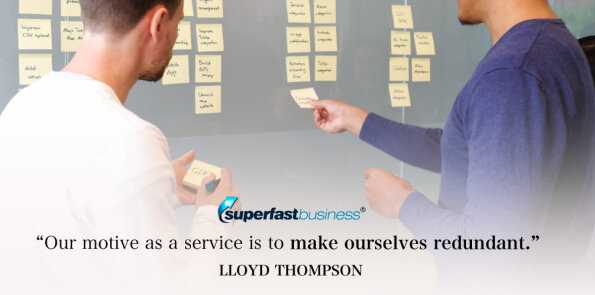As a business owner, you're looking for ways to bring your business vision to life. You may have heard of fractional integrators, and wondered if they’re the solution you need.
In this podcast episode, fractional integrator Lloyd Thompson compares what he does to full-time operations management, to help you decide which option is best for you.
Podcast: Download (Duration: 18:35 — 17.1MB)
Get Notified Of Future Episodes Apple Podcasts | Spotify | Amazon Music | Android | Blubrry | Gaana | TuneIn | Deezer | Anghami | RSS | More
Podcast topics:
What is a fractional integrator? Lloyd breaks the definition down into three main areas. [01:45]
Let’s examine the cost you’re looking at with fractional versus full-time operations management. [03:36]
I’m not their only client – will that affect the quality of service I receive? [06:10]
Do fractional integrators involve themselves in the hiring process? [08:37]
One generally wants to be needed for the long haul; the other aims to become redundant. [09:44]
If success is to eventually not be needed, what do you stand to gain? [12:28]
Does a fractional ever become a full-time team member? [13:28]
If stuff isn’t getting done in your business, this is something to consider. [14:23]
These are the types of businesses that have benefitted from Lloyd’s work…. [15:51]
Pinpoint your real business needs with James’s help
If you’re a regular follower of this podcast, you’ve likely already heard the word “integrator”. For those new to the term, James and returning expert Lloyd Thompson kick things off with a definition, very useful, before comparing the fractional version to the full-time.
A definition in three parts
An integrator, says Lloyd, is there to run your business. This is in contrast to the visionary, the founder, or the CEO, whose proper focus is strategy and building new relationships.
Lloyd likes to break the integrator role into three parts:
1. People – The integrator will manage the visionary’s team.
2. Projects and operations management – The integrator will oversee delivery, ensure the trains are running on time, and make sure the founder’s vision is implemented.
3. Process improvement – An integrator should drive and systemize the business.
A fractional integrator does the above on a fractional, or part-time basis. They will serve a client, and other clients as well, at the same time.
“Where entrepreneurs often fall down is their systems or their people.”
Essentially, an integrator organizes stuff, says James. Because while many entrepreneurs have great ideas, where they often fall down is their systems or their people, and their processes.
The difference in terms of expense
James has a client whose challenge is a business run by three people, via a sort of consensus management. Would an integrator reduce some of the friction between departments and visions?
Lloyd thinks so. Their options would be either a full-time operator or a fractional integrator. The former might cost 100k plus USD for a midsize business. A fractional integrator like Lloyd, on the other hand, could manage an online business of up to 20 staff for 6k USD per month on a month-to-month commitment.
Similar cost base, says James.
Yes, says Lloyd, and a a low-risk investment to try out his service.
Another difference is the full-time operator will usually also expect a stake or at least profit-related pay, which Lloyd considers a reasonable request for a full-time integrator.
And there are other costs, says James. When you hire someone full time, you have to spec the job, interview people, hire. There are employment contracts, payroll, training, superannuation or 401K.
“There’s a huge cost if you hire the wrong person.”
You may have to give equity, and the person may become so critical to your business that they build a little black box. And there’s a huge cost, of course, if you hire the wrong person.
Lloyd’s service is a month-to-month agreement, so if, after 30 days, you’re not happy, you can stop. Their sweet spot for 6 grand is a team of up to 20. They could increase for a bigger team or more facilitation.
Does sharing a service mean quality will suffer?
Now an operator worth 100k is there all the time. With a fractional integrator serving multiple clients, will it take longer, for instance, to get things done?
Lloyd loves the question. And the answer is no.

Firstly, the fractional integrator has to recognize how much change the organization can actually absorb. And it often will be limited, not by the fractional integrator, but how much capacity that company has to change right now.
Secondly, at least for Lloyd’s business, they’re a service, not an individual.
So basically, says James, when someone hires a fractional integrated service, they’re accessing an entire team, and all the experience of that team.
Absolutely right, says Lloyd. And his team, anyway, consists of seasoned professionals who have experience running other businesses, and they’ve often seen solutions to similar problems in other companies.
 Having access to a team rather than an individual is less risky, because with the service, if someone’s sick, goes on holiday, wins the lotto, then the trains continue to run on time, because you’ve got access to a whole team.
Having access to a team rather than an individual is less risky, because with the service, if someone’s sick, goes on holiday, wins the lotto, then the trains continue to run on time, because you’ve got access to a whole team.
How involved in recruitment is an integrator?
Of course, says James, the service provider has to do all the hiring and training and covering of requirements. Because the irony is that many visionaries would hire someone like Lloyd to do things they’re usually not very good at. That would be systems and people.
Does Lloyd ever get involved in the advisory or helping of the hiring process, like, say, when there’s a person missing who they badly need?
Absolutely, says Lloyd. Very early in the engagement, they perform a business audit and pinpoint areas needing improvement. They’ll also highlight low-hanging fruit with high impact, the things they’ll want to target first.
They’ll work out with the visionary what’s important to them, and prioritize that. And every week Lloyd will meet with the client and the assigned integrator. They’ll talk about the vision, and there’ll be coaching or mentorship in order to plan for implementing that vision.
Indispensability versus redundancy
Just thinking things through, says James, it seems a full-time operator would be biased to do a good job and earn praise that would motivate them to do even better.
And of course, they’d want a stake in the business, and to create an environment where they are required for the long haul. Is that different for a fractional integrator?
Lloyd admits he’s biased as a fractional integration service, but he would say their motives are different. A full-time operator might benefit from making themselves indispensable, which can lead to them being a key person risk.
 Lloyd and his team’s motive as a service is to become redundant. They want to make their client’s company a team-run business. And that is achieved when the processes have been so systemized that the team can easily upskill and bring in someone else.
Lloyd and his team’s motive as a service is to become redundant. They want to make their client’s company a team-run business. And that is achieved when the processes have been so systemized that the team can easily upskill and bring in someone else.
If the visionary wants to bring on a full-time operator, they’re not defensive about it. They’ll help transition the new operator in as easily as possible. And they can be there in the background to help ramp up that individual.
If you weren’t sure whether you need a full-time operator or a fractional integrator, says James, it sounds like a fractional integrator is a safe and effective precursor to figure out which role you need.
Lloyd’s motive makes him smile, because before he quit his job as a general manager, his goal was to make his role redundant.
That was the epitome of success. When his managers showed up, they knew what to do, they led their teams, they had no drama, everything was working smoothly.
It also meant that he had to consider his next mission. And that can be hard, which is why in his business, he’s created the environment where, if his team got so good at something they no longer needed to do it, there’s be new avenues for them to explore. They’d always have a role within the business.
When you go in aiming to outlive your usefulness….
When success is no longer being needed, what would be your motivation for taking a job, asks James?
Their business is mainly acquired through referral, says Lloyd. So there’s their motive right there – a glowing reference from the founder, where they’ve gone in and done a good job. It sets them up very nicely for the next piece of work.
And the other thing they can offer is coaching and mentorship. So if the client wants someone full-time, they can be there as support during the transition.
That’s their motives: more business, and continued support should the client wish it.
Do fractionals ever shift to full-time?
Say you got on great with a fractional integrator, and wanted to bring them on full-time – is that a possibility?
It’s not Lloyd’s business model. They’re there to realize your vision, and if you want more capacity, they can dial up. But if you want someone full-time, what they can do is transition a hire in.
Fractional integration is a good way of trying out the role. Maybe you’ve never had an integrator. Does it work for you? Or, says Lloyd, you can try out a specific integrator. Do they fit your model? Your culture? If not, you can end the contract after a month, or try someone else without bringing on a full-time team member.
If stuff isn’t getting done in your business….
You have to get stuff done, says James. If you keep having plans and ideas, but they’re never implemented, that might indicate that a fractional integrator could be a good starting point. Could Lloyd highlight this?
You could need a fractional integrator, says Lloyd, if:
And if you want to get in touch with Lloyd, his email is [email protected].
What types of businesses benefit from Lloyd’s service?
Lloyd has worked with a variety of businesses. All of them are online, but otherwise they’re a bit of a pick and mix.
One is quite big, global, in e-commerce, with 50 members of staff. They’re an example where Lloyd and his team integrated and transitioned in a full-time person. And they gave Lloyd’s service a glowing testimony.
There’s an SEO company, less than 20 staff.
And a video marketer agency. Lloyd is actually doing a bit of software development for them, which is not really their core business, but they’re getting some good results for the client.
James knows he’s in discussion with other types of businesses – memberships, info product creators, influencers. Most of the same sort of clients James speaks to.
Lloyd has a team now that can service different time zones. And his experience has allowed him to vet and train and manage that team. So when clients take on his service, they’re getting access to all of that.
If you want help getting your business vision realized, look up Lloyd and his team at VirtualDOO.com.
Access the wealth of business resources and coaching inside SuperFastBusiness membership
Liked the show? Enjoy all the episodes by subscribing on iTunes









Leave a Reply